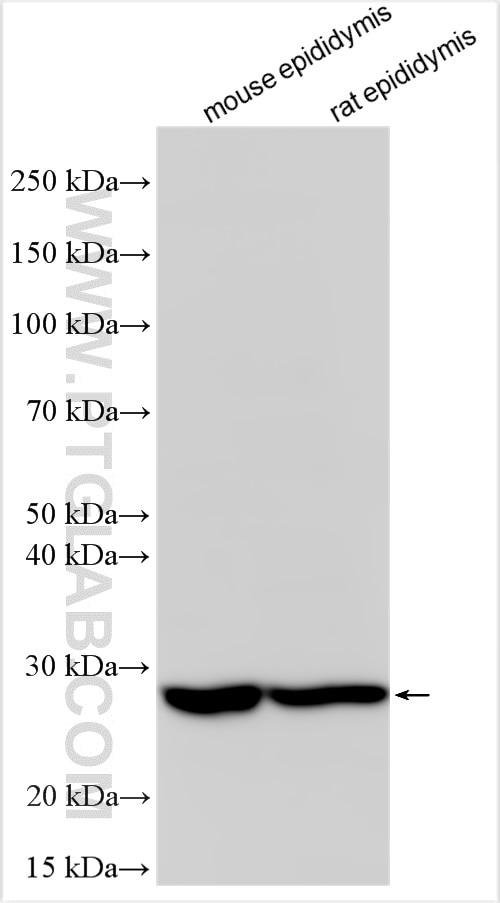Tested Applications
| Positive WB detected in | mouse epididymis tissue, rat epididymis tissue |
Recommended dilution
| Application | Dilution |
|---|---|
| Western Blot (WB) | WB : 1:1000-1:6000 |
| It is recommended that this reagent should be titrated in each testing system to obtain optimal results. | |
| Sample-dependent, Check data in validation data gallery. | |
Product Information
21058-1-AP targets LHFPL5 in WB, ELISA applications and shows reactivity with human, mouse, rat samples.
| Tested Reactivity | human, mouse, rat |
| Host / Isotype | Rabbit / IgG |
| Class | Polyclonal |
| Type | Antibody |
| Immunogen | LHFPL5 fusion protein Ag14663 Predict reactive species |
| Full Name | lipoma HMGIC fusion partner-like 5 |
| Calculated Molecular Weight | 219 aa, 24 kDa |
| Observed Molecular Weight | 28 kDa |
| GenBank Accession Number | BC028630 |
| Gene Symbol | LHFPL5 |
| Gene ID (NCBI) | 222662 |
| RRID | AB_3669355 |
| Conjugate | Unconjugated |
| Form | Liquid |
| Purification Method | Antigen affinity purification |
| UNIPROT ID | Q8TAF8 |
| Storage Buffer | PBS with 0.02% sodium azide and 50% glycerol, pH 7.3. |
| Storage Conditions | Store at -20°C. Stable for one year after shipment. Aliquoting is unnecessary for -20oC storage. 20ul sizes contain 0.1% BSA. |
Background Information
LHFPL5 (lipoma HMGIC fusion partner-like 5), previously known as TMHS (tetraspan membrane protein of hair cell stereocilia), is necessary for proper MET channel function. LHFPL5 is a four transmembrane segment protein from the superfamily of tetraspan proteins that includes the claudin tight junction proteins, gap junction proteins, peripheral myelin proteins, and ion channel auxiliary subunits (PMID: 36781873).
Protocols
| Product Specific Protocols | |
|---|---|
| WB protocol for LHFPL5 antibody 21058-1-AP | Download protocol |
| Standard Protocols | |
|---|---|
| Click here to view our Standard Protocols |



